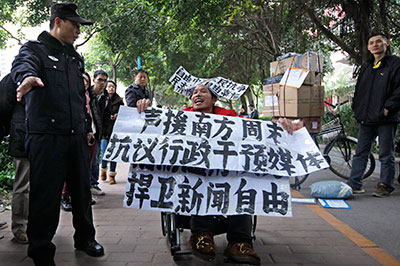There is cautious optimism among China media watchers this morning over the news that a deal has been struck between censors and protesting journalists at China’s Southern Weekly news magazine, which is also known as Southern Weekend. The journalists will not face reprisals for their protest, and propaganda authorities will not repeat the editing stunt (which transformed a pro-reform New Year editorial into a tribute to the Communist Party) that sparked the dispute, according to The Associated Press.
So how far should we be cautious, and how far optimistic? Unfortunately, it’s too soon to tell. It is good news that officials have made a gesture towards compromise. The dispute should stand as a landmark for Chinese journalists going forward, proving that they have a platform to express their frustration with restrictive censorship measures. But it’s also common for officials in China to cave in to demonstrators’ demands for change as a quick means to resolving embarrassing public disputes. As local and international attention to the issue fades, protest organizers remain vulnerable to retribution.
For journalists, in particular, that retribution can be hard to track. We hope the days when professional journalists are jailed for crossing officials are over, but with 32 freelance and ethnic-minority journalists being held at the time of CPJ’s prison census on December 1, 2012, we can’t be sure. Fines, demotion, enforced leave, and outright dismissal are standard ways journalists are disciplined for flouting censorship rules, and they are always warned not to publicize their punishment, meaning that news of such measures is often imprecise and difficult to confirm.
It’s time for this punitive, mysterious way of manipulating journalists for the sake of maintaining the illusion of stability in China to end. The Southern Weekly group, and their colleagues at Beijing News, have timed their protest well, appealing to rulers in transition who have an opportunity to show that their leadership is in tune with the wishes of the media and the people. As I wrote for the Guardian website today:
By taking their dispute public, Southern Weekly has blown these secretive, behind-the-scenes machinations wide open. They’ve provided the public with an excuse to express widespread frustration with the status quo of media censorship, and the public has responded. It’s time for Communist party leaders to do the same. Punishing the Weekly staff would mark a real setback for the prospect of reform. Instead, Xi Jinping could transform several damaging years of press restrictions–by listening to China’s media.
